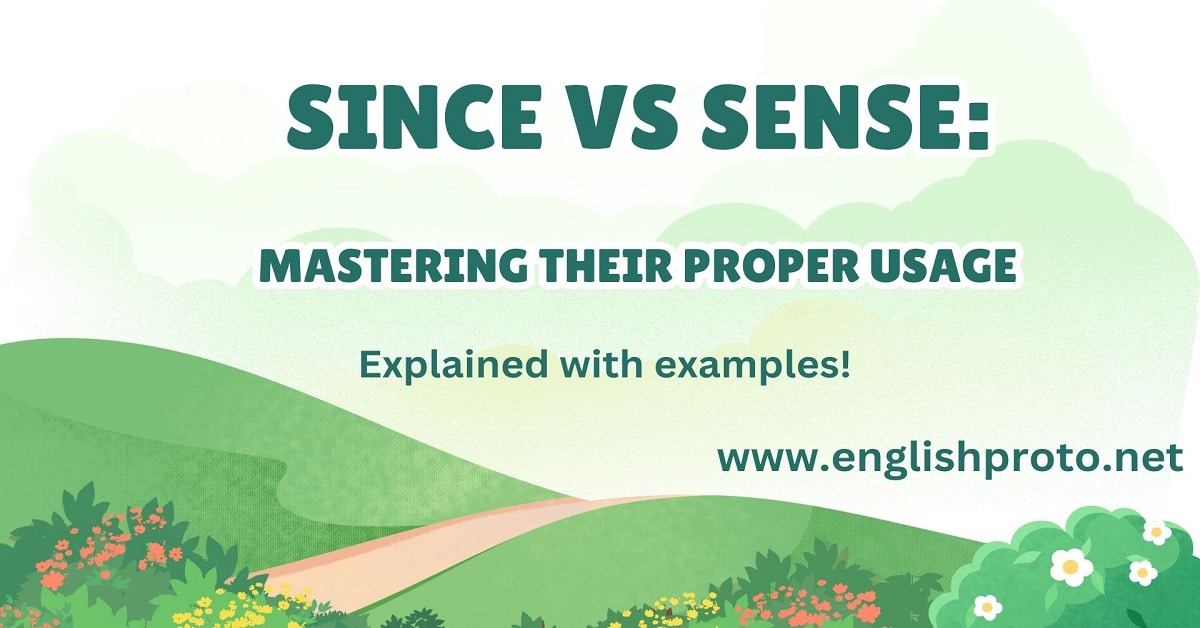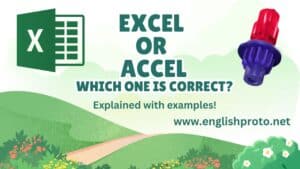Since vs Sense: Mastering Their Proper Usage—two simple words, yet they often trip up even the best of us. Have you ever found yourself hesitating, wondering which one fits your sentence? You’re not alone!
These words sound similar, but their meanings and uses couldn’t be more different. Getting them right can make your writing sharper and your communication clearer.
Imagine the confidence you’ll gain when you can effortlessly distinguish between “since” for time or cause and “sense” for perception or understanding.
This article breaks it all down for you with relatable examples, practical tips, and a dash of history. Ready to master the difference? Let’s dive in!
Quick Summary: Since vs Sense
Here’s a brief breakdown of the two words:
- Since: Refers to time or causation, often acting as a conjunction, preposition, or adverb.
- Example: Since the project started, our team has grown significantly.
- Sense: Relates to perception, logic, or understanding, functioning as a noun or verb.
- Example: His explanation made perfect sense once he clarified the details.
Key Takeaways
- Since is used for time-related references or to indicate cause and effect.
- Sense describes perception, judgment, or something logical and coherent.
- These words are not interchangeable, and understanding their differences is crucial for effective communication.
Why Do People Confuse Since vs Sense?
The confusion between since and sense arises from several factors:
1. Similar Pronunciation
Depending on regional accents and speech patterns, since and sense can sound strikingly similar. This phonetic overlap often leads to mishearing or incorrect usage in casual conversation and writing.
2. Overlapping Contexts
Both words can appear in similar contexts, especially when discussing reasoning or sequences. Without clear attention to their specific roles, they may be misapplied.
3. Phonetic Spelling Mistakes
In spoken English, words are often spelled based on how they sound. Writers who rely on this strategy may mistakenly swap sense for since or vice versa.
4. Lack of Familiarity with Grammar Rules
For learners of English or casual writers, the grammatical distinctions between the two words may not always be clear. This lack of familiarity can lead to mixing up their meanings and usages.
Detailed Explanation of Since
The word since performs two main functions in English:
1. Time Reference
When used in a temporal sense, since pinpoints a starting point for an event or action. It’s typically followed by a specific moment in time or a reference to when something began.
- Example: We’ve been friends since college.
- Example: The shop has been closed since last Monday.
In these examples, since identifies when a particular condition or action started and suggests continuity.
Quick Tip: If your sentence answers the question “when?”, since is likely the correct word.
2. Causation
Since also conveys cause-and-effect relationships, functioning similarly to “because.”
- Example: Since it’s raining, let’s stay indoors.
- Example: Since you’re already here, why not join us?
In this context, since explains the reasoning behind an action or decision.
Quick Tip: If “because” fits naturally in your sentence, you’re probably using since correctly.
Detailed Explanation of Sense
The word sense is broader and encompasses several meanings related to perception, logic, and judgment.
1. Perception
Sense often refers to the five physical senses (sight, hearing, smell, taste, touch) or an emotional feeling.
- Example: The fragrant flowers delighted her sense of smell.
- Example: His humor added a sense of joy to the gathering.
2. Logic and Understanding
Sense describes something logical, coherent, or meaningful.
- Example: Your argument doesn’t make any sense.
- Example: Her solution brought clarity and sense to a complex problem.
3. Judgment or Practicality
Common phrases like “common sense” emphasize judgment or practical reasoning.
- Example: He showed great sense by avoiding the risky investment.
Quick Tip: Substitute “understanding” or “perception” for sense in your sentence. If it fits, you’re using the word correctly.
Common Errors and How to Avoid Them
Here are some frequent mistakes involving since and sense, along with corrections:
- Incorrect: She hasn’t called me sense last Friday.
Correct: She hasn’t called me since last Friday. - Incorrect: This explanation doesn’t since.
Correct: This explanation doesn’t make any sense. - Incorrect: Since of his strong leadership, the team succeeded.
Correct: Because of his strong leadership, the team succeeded.
Quick Tip: Double-check your sentence for clarity. Ask yourself if you’re discussing time, causation, or perception to choose the right word.
Synonyms or Alternatives
Sometimes, you might want to replace since or sense with alternative words or phrases to better fit your sentence.
For Since
- Because
- As
- From the time that
For Sense
- Understanding
- Logic
- Awareness
- Perception
Examples in Sentences
To reinforce the distinction, here are examples using each word:
Since
- I’ve been working from home since the pandemic started.
- He hasn’t stopped smiling since he won the award.
- Since you’re here early, we can set up the decorations.
Sense
- His decision made no sense to the rest of the team.
- The music created a calming sense of peace.
- She had the good sense to seek advice before making a major decision.
Comparison Table: Since vs Sense
| Aspect | Since | Sense |
|---|---|---|
| Meaning | Indicates time or causation | Relates to perception, logic, or meaning |
| Function | Conjunction, adverb, preposition | Noun, occasionally verb |
| Example Sentence | I’ve loved books since I was a child. | His reasoning made perfect sense. |
| Common Substitutes | “Because,” “from the time of,” “as” | “Understanding,” “logic,” “awareness” |
Origins and History
- Since: Originating from the Old French term de puis and the Latin postea, since evolved in Middle English to refer to a point in time. Over the centuries, its usage expanded to include causal meanings, reflecting changes in conversational and written English.
- Sense: The word sense stems from the Latin sensus, meaning “feeling” or “perception.” Its initial use referred to the physical senses, but it gradually broadened to encompass judgment, logic, and understanding.
Conclusion: Since vs Sense
Understanding the difference between since and sense is crucial for effective communication. These words, while similar in sound, have unique roles that contribute to clearer and more precise writing.
Key Points to Remember:
- Use since for time-related references or causation.
- Use sense to describe perception, logic, or meaning.
By practicing their proper usage and paying attention to context, you can elevate your writing and avoid common mistakes. With this knowledge, you’re now better equipped to tackle any confusion surrounding since and sense with confidence.



